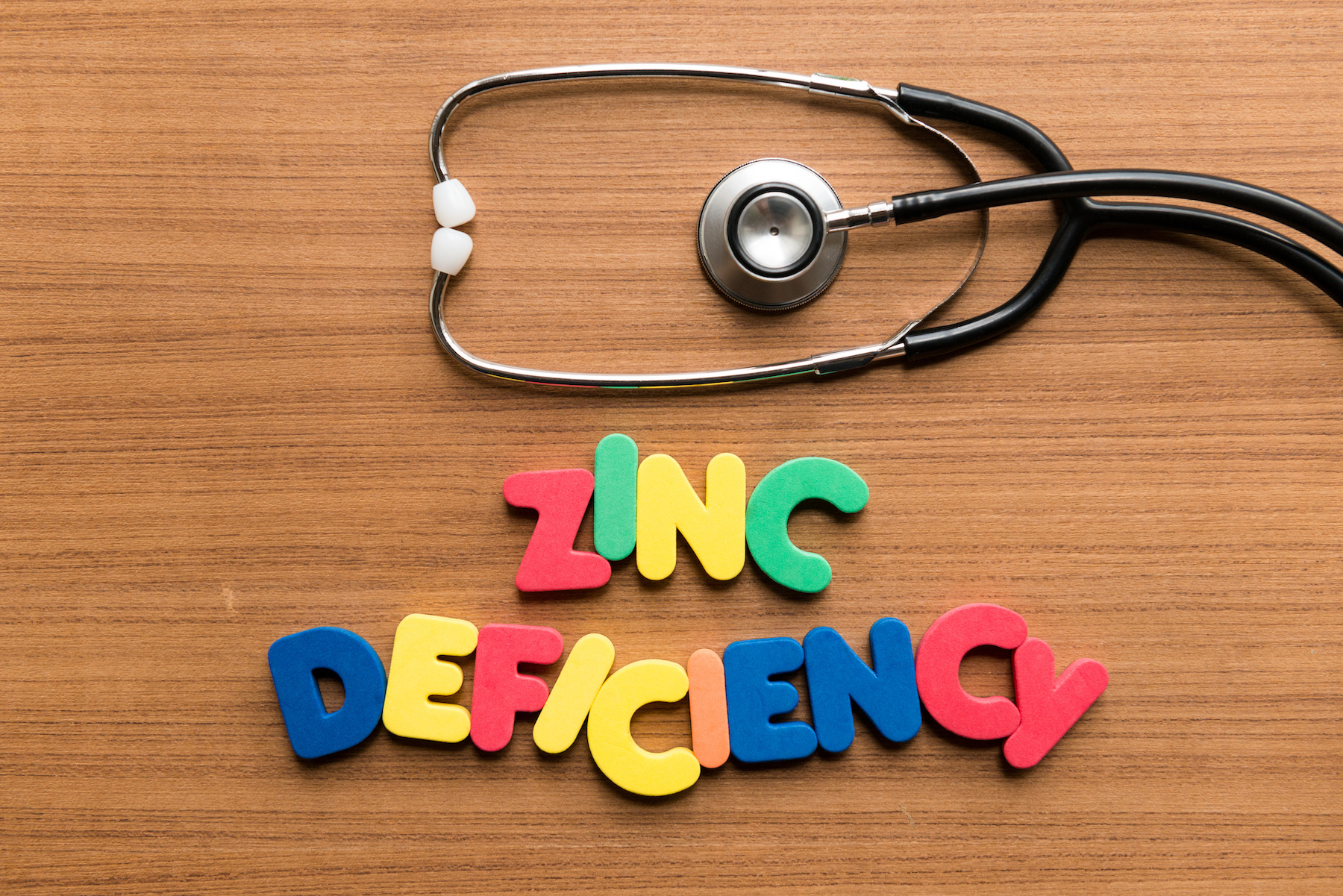

Do you know the most abundant trace mineral in the body – one that’s involved in immune function and reducing inflammation? It’s zinc! While most people don’t think twice about this mineral, getting enough makes a difference.
Zinc supports more than 300 enzymes and is involved in cellular communication, proliferation, differentiation, and survival. Not only that, but it also plays a substantial role in reproduction, immune function, and wound repair.
But research shows we don’t get enough of it. Dietary zinc deficiency affects 20-25% of the world’s population!
Zinc Deficiency Causes
Zinc deficiency is often caused by nutritional deficits. This can be due to a diet high in lignin, a compound found in the cell walls of plants, or a high intake of phytates, found in whole grains, legumes, nuts, and seeds. These phytates can impact absorption of iron, zinc, magnesium, and calcium. Vegetarians and vegans often consume high levels of lignin and phytates so they should be aware of the higher potential for zinc deficiency.
Zinc Deficiency Symptoms Include:
- Rough skin or dermatitis
- Slight weight loss or stagnant growth in children – One study showed that children at risk for zinc deficiency showed improvements in height and weight gain when given zinc supplementation!
- Diarrhea
- Hair loss
- Delayed wound healing
- Low bone mineral density
- Tongue inflammation
- Discoloration and distortion of normal nails, called nail dystrophy
- Low sperm count, or oligospermia
- Hyperammonemia, a metabolic condition caused by high levels of ammonia in the blood
Zinc and the Immune System
Zinc plays an important role in both the innate and adaptive immune system responses. With zinc deficiency, the workers of the immune system like monocytes, lymphocytes, T cells and B cells are altered. These cells don’t mature right and can even change function, leading to an unbalanced ratio of other cells in the immune system such as Th1 and Th2. These cells are subtypes of T cells that work to fight infections. But with zinc deficiency, an unbalanced ratio of Th1 and Th2 can occur. Lymphopenia, a condition of low lymphocyte or white blood cell levels in the blood, can also occur, decreasing the body’s ability to fight infection.
Natural killer cells also depend on zinc. Natural killer cells work to induce cell death in infected cells and help maintain balance in the immune system. But, with zinc deficiency, natural killer cells are weakened.
Inflammation and Zinc Deficiency
Inflammation is how your body protects itself and heals from disease, injury, or infection. Temporary inflammation can be helpful – like healing a cut on your hand. The skin around the cut becomes red and painful for a day or two then heals with new connective tissue fibers. This is a normal, healthy process.
When inflammation lasts too long, it can become chronic and cause damage to healthy tissues. This could be from chronic infections, smoking, chemicals in the environment, or autoimmune disorders.
So where does zinc come in? When cells are exposed to inflammatory molecules such as cytokines, zinc moves into the cells causing a decrease in plasma zinc levels. So we see zinc concentrations rapidly decline during the acute phase of inflammation. Once zinc moves into the cells, it works at neutralizing free radicals, protein synthesis, and to prevent further microbial invasion.
But when zinc levels decline because they’ve moved into the cells, further inflammation results. This explains why studies show an association between acute illness and low levels of zinc in the plasma.
We can quantify inflammation in a lab value called CRP, or C-reactive protein. A CRP test looks at how much inflammation is in the body. I like to look at the high sensitivity CRP as it is more sensitive than the regular CRP since it gives results all the way down to 0.2 vs the regular CRP reports only above 3.0. Optimal hsCRP levels are less than 1. Higher than 1.0 means there is inflammation happening somewhere in the body. Learn more about CRP here.
Zinc and Autoimmunity
In patients with autoimmune disease, zinc concentrations are significantly lower than those without these diseases. Zinc works to modulate inflammatory processes, so without it autoimmune diseases can develop. Type 1 diabetes, rheumatoid arthritis, MS, Sjogrens, lupus, celiac, Hashimoto’s, and juvenile idiopathic arthritis are all impacted by low levels of zinc. When autoimmunity begins, it’s further impacted by zinc deficiency and the inflammatory process.
Zinc Supplementation
Clinical trials show that zinc supplementation can prevent chronic inflammation and improve zinc deficiency symptoms.
While there are many forms of zinc, zinc glycinate is one of the best forms for supplementation because of its high bioavailability in the body. Zinc glycinate is absorbed well, so more of the mineral can be used – plus it doesn’t cause gastrointestinal discomfort like some zinc supplements. Here’s a great zinc supplement made with zinc glycinate.
Adding in specific foods high in zinc can also help boost zinc levels. Foods like red meat, poultry, wild rice, seeds, and nuts like almonds or cashews can all help.
It should be noted that you should not supplement zinc for long periods of time without checking blood levels. When zinc is too high long term can lead to imbalances in other minerals and also cause symptoms.
Other Benefits of Zinc
While zinc plays a role in immune function and inflammation, it also plays a role in many other areas within the body.
Research shows that zinc plays a role in:
- Sleep
- ADHD
- Acne
- Hair loss
- Bone health
- Hormone balance
- Blood sugar regulation
- Depression
- Epigenetics, specifically in fetal development
- Proteins in the blood (albumin, prealbumin, and transferrin)
- Dark, discolored patches on skin called melasma
One area of continued promising research is in zinc’s role in cardiovascular disease. Both zinc and copper have a role in cardiovascular disease, with deficiency increasing the risk of coronary heart disease, acute and chronic heart failure, and cardiac hypertrophy or an enlarged heart. Zinc deficiency can also lead to the expansion of mitochondrial compartments in the heart and an increase in inflammatory markers like interleukin-1 (IL-1) and (IL-6). These markers work to regulate inflammatory responses within the immune system.
Zinc and Functional Medicine
Zinc is an essential mineral in the body so it makes sense that treating zinc deficiency symptoms should be a priority. Starting with a zinc supplement can help, after your blood levels have been checked by your doctor.
But if you want more support getting to the root of lingering symptoms or are worried about zinc deficiency symptoms, it’s time to make an appointment with your functional medicine provider. At Arizona Wellness Medicine, we treat every patient as unique, working to get to the root of your symptoms. Our team of functional medicine providers are trained to look outside the box to find lasting solutions that work for you. To make an appointment with one of our highly trained functional medicine providers, make an appointment here.
Resources:
Share:
Dr. Emily Parke
Social Media
Most Popular Posts
Subscribe To Our Newsletter
Related Posts

How Fructose Intake Affects Metabolic Health: What You Need to Know
Fructose, found naturally in fruits and added to processed foods as high fructose corn syrup, impacts health. Learn the metabolic effects of fructose intake.

Get More Vitamin D for Better Health!
Of all the vitamins and minerals you should be sure you’re getting enough of, vitamin D is perhaps one of the most important. The benefits of vitamin D are widespread and pretty incredible.

The Science Behind Protein: The Optimal Amount of Protein in the Diet Based on Age and Activity Level
Different amounts of protein are needed at different stages of life. Learn about protein, how much you need, and what happens when you don’t get enough.

Magnesium: The Essential Mineral, Its Role in the Body, and What to Know About Magnesium Supplements
Learn about the mineral magnesium, its role in the body, how to spot magnesium deficiency, and the most bioavailable forms of magnesium to supplement with.
